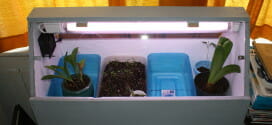If you are an organic gardener then homemade plant food is the cheapest and easiest way to ensure that your plants and your soil remain happy and healthy. You can make organic plant food from materials you are likely to already have access to in your organic garden or in the natural environment close to your home. Here are twelve possible recipes for organic fertilizer:
1- Seaweed Homemade Plant Food
If you live by the sea or ocean then seaweed is a valuable natural resource. Seaweed can also be used to make a homemade plant fertilizer. Since seaweed is rich in both potassium and trace elements, it can be great for the overall health of your soil as well as for various crops.

2- Compost Tea As A Plant Food
If you are already making a good quality compost at home, you can use some of that compost to make one of the quickest and easiest natural plant fertilizers imaginable. Simply add a good shovelful of good compost to water, strain the resulting liquor and use it on your vegetable patch.

3- Use Comfrey Tea For Plant Food
Comfrey is a plant that is extremely useful to the organic gardener in a number of different ways. All organic gardeners should have a comfrey patch in their gardens. Comfrey leaves decomposed in water make a liquid feed comparable in nutrition to commercial feeds. If you wish, you can add Epsom salts to this concoction to provide magnesium.

4- Manure Tea Homemade Plant Food
If you keep livestock or live rurally and have access to farm manure then you can use these manures in a number of different ways to enrich your soil. One such way is to make a liquid feed. You can use the manure of a number of different creatures to create this liquid gold.

5- Use Nettle Tea As A Homemade Plant Food
Nettles are a common weed that, if handled carefully, can be a real boon to any organic gardener. Nettles can be used to make a nitrogen rich garden fertilizer for leafy plants. Simply allow nettles to rot down in water to make a stinky yet nutritious mix.

6- Weed Tea Homemade Plant Food
Nettles are not the only plant containing nutrients that can be recycled into organic plant food. You can also use the same idea to make use of common weeds plucked from your vegetable beds. This is a way to return their nutrients to the soil without risking spreading them by putting them in your compost.

7- Potash Liquid Feed
Wood ash is a great source of potassium and can be great for fruiting plants. Unfortunately, if you make a liquid feed with wood ash and water alone then the result would be strongly alkaline. There are various options for making this mix more acidic – though not everyone will opt for the option below.
8- Wormery Liquid Feed
A variation on the compost tea mentioned above, this version uses the liquid found at the bottom of a wormery, in which worms turn your household scraps into good quality worm-castings and composted materials. The liquid drained off from the bottom of a wormery is a great food for plants and you can even make the wormery yourself.
9- Molasses Homemade Plant Feed
Sugary molasses may not seem the obvious thing to use on your garden but it has been used as an ingredient in garden fertilizer for generations in various parts of the world. This store cupboard ingredient could be great for a low-cost, homemade solution to feeding your soil.

10- Fish Homemade Plant Fertilizer
Though vegetarians will be likely to want to steer clear of this one, if you eat fish you can make your own fish fertilizer using the waste by-products of the fish that you eat or whole fish if you have them available and going to waste.
11- Green Tea Plant Fertilizer
There is a lot of talk of making liquid feeds, called ‘teas’, but how about using actual tea to fertilize your plants? Green tea can be used to feed plants in a number of different ways and can help plants grow up happy and healthy.
12- Homemade Bonemeal Fertiliser
If your garden is short of phosphorus then you may want to create a fertiliser that contains plenty. Meat eaters can use the bones from meat meals to make their own bone meal fertiliser – a great solution for those looking to avoid supporting the factory farmed meat industry.

If you look around you will discover that there is no need to rely on chemical fertilisers when there are so many great organic alternatives for homemade plant food that you can make yourself at home.

